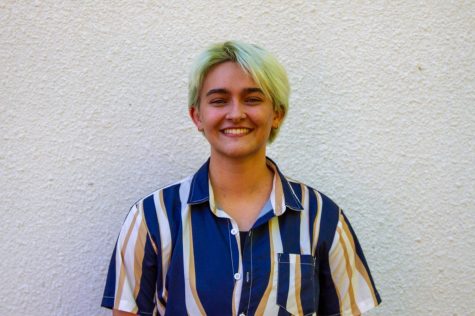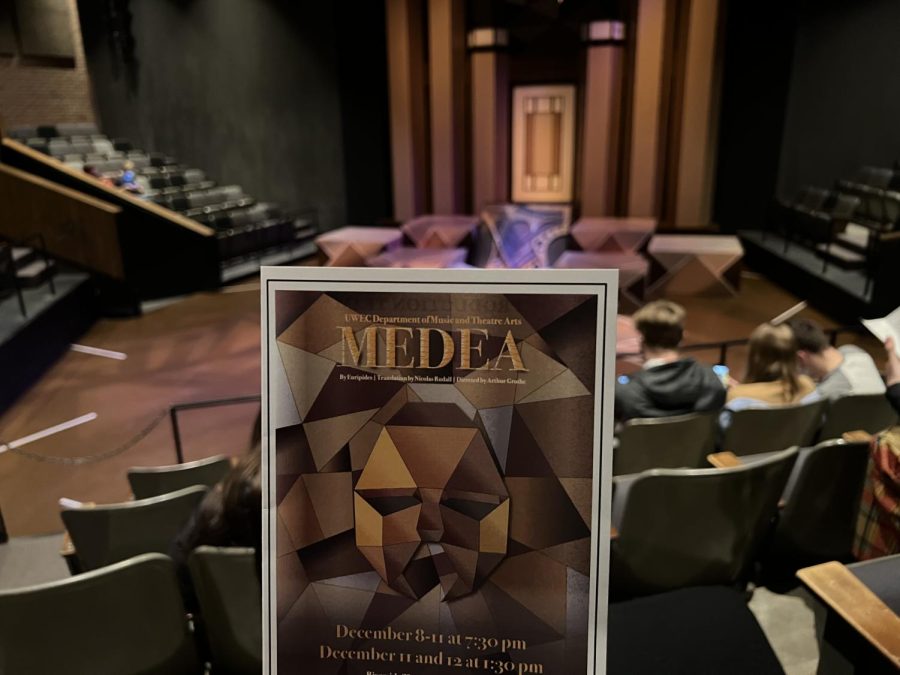A dark, Greek tale
UWEC performed the classic Greek play Medea
Photo by Timothy Spierings
The UW-Eau Claire production of “Medea” took place in the Riverside Theatre in Haas Fine Arts Center.
The play started with a nursemaid striding slowly to the back of a torn-open piano. She reached out to the piano strings and plucked them as she started to tell her tale.
Soon, a shriek ripped through the air, a disembodied voice that said she ached and hurt thanks to the actions of her husband’s treachery.
UW-Eau Claire put on several performances of “Medea,” a classic Greek play on Dec. 9 through Dec. 12 at the Riverside Theatre in the Haas Fine Arts Center.
Arthur Grothe, professor of theatre arts and the director of Medea, said the decision to perform Medea is due to a four-year rotation the theater department puts on to ensure that students are able to be part of a variety of shows.
The current rotation called for a classical work, which means either a Shakespearean piece or a Greek play, he said. Since the theater department performed Shakespeare last year, that left the latter as their option.
The tale of Medea is based on the wife of Jason, from the classic Greek tale of Jason and the Argonauts. Medea helped Jason get a golden fleece from her father, King Peleus, killing both the King and her brother in the process.
The two have sought asylum in the Greek city of Corinth, Grothe said. During their time there with their two sons, Jason seeks out a new wife in the princess of Corinth, Glauke, and is “kicking Medea to the curb.”
“The city itself is on the side of Jason, to them he is in the right,” Grothe said. “So in order to exact revenge, she plots to kill his new wife by giving her a poisoned garment that when she puts it on, kills her.”
Medea also goes on to kill her two children to finish enacting her revenge against Jason, standing above him on bloody pillars as he stands below her on the main stage.
Grothe said the story of Medea is timely in the sense that the situation presents someone as “other” in this equation, which they are ostracized for.
“The systems that are in place and the society and the structures of that society really keep Medea oppressed and keep her down and offer her little outlet,” Grothe said. “And that seemed like a story that a lot of people could relate to.”
For students like Will O’Brien, this is their first time acting in front of an audience in two years.
O’Brien, a fourth-year English student and the actor of Creon, king of Corinth, said the use of masks in Greek theater has allowed the cast to overcome the challenges of COVID-19.
Traditional Greek theater calls for actors to wear masks to represent the roles they play, which the cast also used for this production. Due to COVID-19 restrictions, the cast also wore protective face masks underneath their character masks as a precaution.
“There are a lot of subtleties that actors use to express emotion through their face or through small tweaks in body language,” O’Brien said. “But with the mask, you really have to get more into the gestures and you’re not relying on your face as much.”
13 UW-Eau Claire students acted in Medea, along with two local children to play the role of Medea’s sons.
To find more UW-Eau Claire theater productions, check out the events page here.
Spierings can be reached at [email protected].

Timothy Spierings is a fourth-year Spanish and journalism student. This is their eighth semester on The Spectator staff. They enjoy trying all types of new foods and listening to new music artists and are currently trying to learn the bass guitar.

